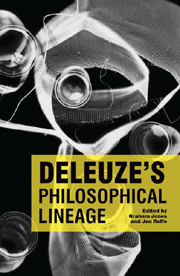Book contents
- Frontmatter
- Contents
- Acknowledgements
- List of Abbreviations
- Introduction: Into the Labyrinth
- 1 Plato
- 2 John Duns Scotus
- 3 G. W. F. Leibniz
- 4 David Hume
- 5 Immanuel Kant
- 6 Solomon Maimon
- 7 G. W. F. Hegel
- 8 Karl Marx
- 9 Hoëne Wronski and Francis Warrain
- 10 Bernhard Riemann
- 11 Gabriel Tarde
- 12 Sigmund Freud
- 13 Henri Bergson
- 14 Edmund Husserl
- 15 A. N. Whitehead
- 16 Raymond Ruyer
- 17 Martin Heidegger
- 18 Pierre Klossowski
- 19 Albert Lautman
- 20 Gilbert Simondon
- Bibliography
- Notes on Contributors
- Index
19 - Albert Lautman
Published online by Cambridge University Press: 12 September 2012
- Frontmatter
- Contents
- Acknowledgements
- List of Abbreviations
- Introduction: Into the Labyrinth
- 1 Plato
- 2 John Duns Scotus
- 3 G. W. F. Leibniz
- 4 David Hume
- 5 Immanuel Kant
- 6 Solomon Maimon
- 7 G. W. F. Hegel
- 8 Karl Marx
- 9 Hoëne Wronski and Francis Warrain
- 10 Bernhard Riemann
- 11 Gabriel Tarde
- 12 Sigmund Freud
- 13 Henri Bergson
- 14 Edmund Husserl
- 15 A. N. Whitehead
- 16 Raymond Ruyer
- 17 Martin Heidegger
- 18 Pierre Klossowski
- 19 Albert Lautman
- 20 Gilbert Simondon
- Bibliography
- Notes on Contributors
- Index
Summary
Albert Lautman (1908–44) was a philosopher of mathematics working in the decades between the two world wars in the first half of the twentieth century. He postulated a conception of mathematics that is both formalist and structuralist in the Hilbertian sense. The reference to the axiomatic structuralism of Hilbert is foundational for Lautman, and it is because of this that his views on mathematical reality and on the philosophy of mathematics parted with the dominant tendencies of mathematical epistemology of his time. Lautman considered the role of philosophy, and of the philosopher, in relation to mathematics to be quite specific. He writes that: ‘in the development of mathematics, a reality is affirmed that mathematical philosophy has as its function to recognize and to describe’. He goes on to characterise this reality as an ‘ideal reality’ that ‘governs’ the development of mathematics. He maintains that ‘what mathematics leaves for the philosopher to hope for, is a truth which would appear in the harmony of its edifices, and in this field as in all others, the search for the primitive concepts must yield place to a synthetic study of the whole’.
One of the tasks, indeed the challenges, that Lautman set himself, but never carried through because of his early tragic demise – he was captured by the Nazis in 1944 and shot for being an active member of the resistance – was the task of deploying his mathematical philosophy in other domains.
- Type
- Chapter
- Information
- Deleuze's Philosophical Lineage , pp. 356 - 379Publisher: Edinburgh University PressPrint publication year: 2009



